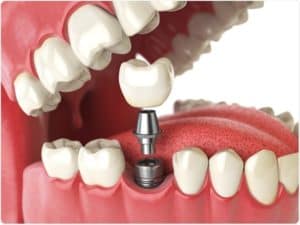Latest News
How long after dental implants can I eat normally?

Dental implants
Dental implants were invented by a Swedish orthopedic surgeon named Per-Ingvar Branemark in 1952. Since then, dental implants are used for mounting artificial teeth. Dental implants are placed beneath gums over the jawbone by replacing the root portion of the tooth. The process of integration of the screw of implants with natural bone is known as Osseointegration.
This process is very important as the implant fuses with the bone and becomes stable for holding teeth. On average, the osseointegration process takes around 2-4 months to get completed and after the integration is over and stable, the dental implant can be attached with permanent teeth that can be used normally.
Ingestion Advice post Implantation
Dental implantation is a painful surgery and strong anesthesia is administered to make the area senseless and less painful. It is advisable to take care of the diet strictly and follow the instructions of a prosthodontist as well as a nutritionist.
- Initial 24 hours
After the surgery, the dental area will be senseless and ingestion is not recommended until 4 hours of the process is over. The gauze sponges applied to the gums post-surgery can be removed and the patient can eat food. During the initial 24 hours, the patient may observe inflammation, redness, swelling, bruising, and bleeding from the gums. This is normal to expect after the surgery.
The food intake should be limited to soft and fluid preparations, neither too hot nor too cold. Soft food such as lukewarm soup, purees, curries, and shakes should be taken. The food should be taken in small quantities and should not be sucked with straws. The patient should drink plenty of water, fruit juice, and nutrition shakes for a quick healing process.
- First Few Weeks
The patient is advised to continue intaking soft foods that will not require chewing. There will be some amount of pain and swelling, which will hamper normal eating habits. During the first few weeks, a soft food diet is mandatory. Either too hot or too cold temperature must be avoided as it may increase the sensitivity and aggravate the condition. A good healthy well-balanced diet should be taken and the patient should not skip meals. Vitamin supplements can be administered along with the suggested medicines.

- First Few Months
During the first 2-4 months, the Osseointegration process takes place and bone fusion is necessary for making the implantation process successful. The diet should majorly comprise soft food and patients are advised to avoid food that is too hard or crunchy. During this time, the implantations should not be disturbed and food which requires too much chewing should be strictly prohibited. As a general rule of thumb, food that makes noise while chewing must be avoided.
- Post Osseointegration
After the process of bone fusion is complete, patients can start having a normal diet. The implantation is fused with the jawbone and it will not be ruptured while having normal food. However, too hard food must be avoided as much as possible because it might cause pain and result in bleeding.
Best Food Options Post Implantation
After implantation surgery, it is advisable to eat soft food that is neither too hot nor too cold. Soft homecooked food with high nutrition value should be ingested. Fruit juices and nutrition shakes should be taken directly from the glass avoiding sucking with straw. If a patient drink with a straw, the sucking of air may result in a dry socket inside the implant, and blood clotting may further extravagate the situation. The recommended foods to eat after implantation surgery are:
- Boiled and mashed potatoes
- Yogurt and milk products
- Milkshakes and nutrition shakes
- Soft dairy products
- Boiled vegetables and soft fruits
- Cheese and macaroni products
- Soups
- Half-boiled eggs
- Jellies and pudding
- Oatmeal and cornflakes with milk
Foods to Avoid Post-Surgery
After the installation of dental implants, patients should refrain from eating hard and crunchy food. During the first few months, the patient should follow a well-balanced nutritious diet majorly comprising of soft food. Hard food, or food which is too hold or cold interrupts with osseointegration. To speed up the healing process and decrease recovery time, the following food must be avoided:
- Acidic food items such as tomatoes and citrus food
- Sugary food or food rich in carbohydrates such as soft drinks and candy
- Sticky food items like gums and dry fruits
- Extremely cold or hot food
- Spicy food and cooked preparations
- Crunchy or hard food
- Popcorn or food particles that can go deep inside the implants
- Alcoholic beverages
It is necessary to maintain a healthy diet and eat well-balanced nutrition-rich food. For improving the recovery time and speed the healing process a diet with a high amount of vitamins and minerals is necessary. It is important to have soft food and dietary restrictions should be followed.
Harper Harrison is a reporter for The Hear UP. Harper got an internship at the NPR and worked as a reporter and producer. harper has also worked as a reporter for the Medium. Harper covers health and science for The Hear UP.










